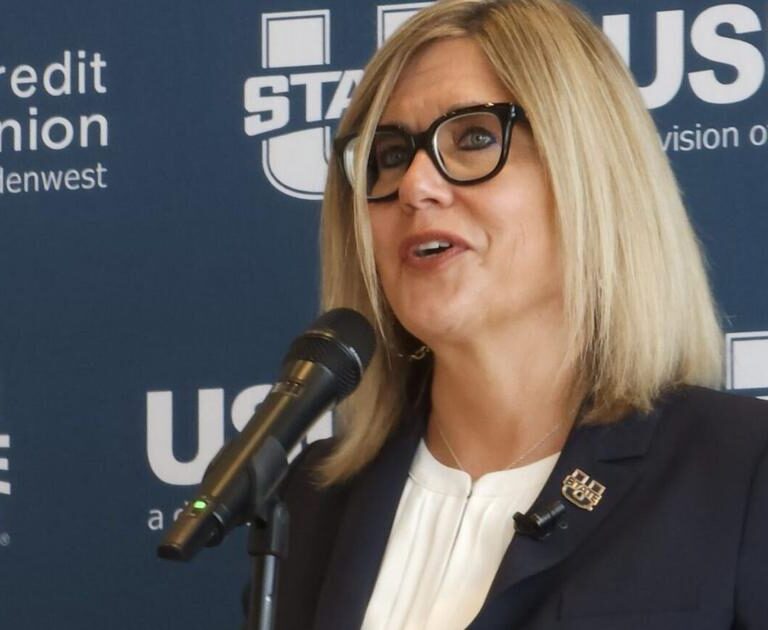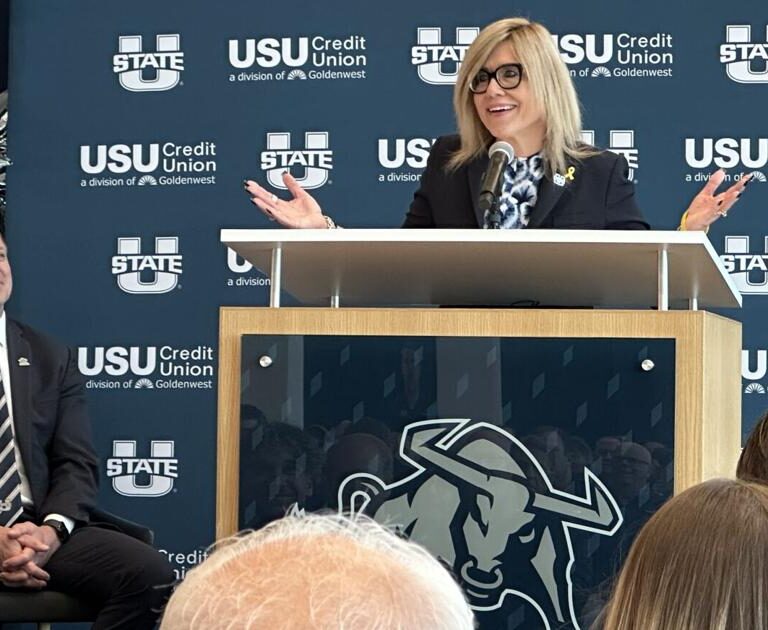LAS VEGAS (AP) — With the Pac-12 Conference about to play its final men’s and women’s basketball tournaments — at least in their current state — there is an opportunity for one of the other four leagues in the region to step to the forefront in Las Vegas.
The Mountain West and West Coast Conference are the most likely candidates to replace the Pac-12 in terms of recognition, though the Big West and Western Athletic Conference could receive more visibility as well.
The Mountain West, in particular, is having probably its best season. ESPN’s Joe Lunardi projects six teams to make the NCAA Tournament, which would top the five the league sent in 2013. Four Mountain West teams made the tournament each of the past two years.
“We’ve always been a historically strong basketball conference, so I don’t feel like it’s, ‘Oh, wow, look at the Mountain West,’” MW Commissioner Gloria Nevarez said. “I feel like it’s a little bit more like, ‘OK, we’re back. We’re where we should be.’”
For Nevarez, watching the Pac-12 all but disintegrate hits close to home. She was a senior associate commissioner in that conference from 2010-18, overseeing women’s sports.
Nevarez also has strong ties to the WCC, having served as commissioner from 2018-22 before taking the Mountain West job. Her WCC successor is Stu Jackson, a former longtime NBA executive and ex-New York Knicks coach.
Jackson, who played at Oregon and previously worked as an assistant coach in the old Pac-10, said the Pac-12’s departure “gives the other four tournaments a chance to elevate ourselves during what is a terrific week of basketball in Las Vegas.”
“But I’d be remiss if I didn’t say that not having the Pac-12 there, it’s an unfortunate loss,” Jackson added. “You lose some of the media, business partners, a share in the buzz. So it’s just not good for college athletics as a whole.”
The Mountain West, with a three-year exception in the early 2000s when the conference moved its tournament to Denver, has played its men’s and women’s basketball tournaments in Las Vegas from the beginning in 2000.
Conference member UNLV has been the host each of those years, which caused much of the rest of the league to gripe until the Rebels stopped becoming serious contenders about a decade ago. The criticisms could return if UNLV, which has won nine of 10 games, makes a strong run in this tournament.
The WCC took the lead of going into Las Vegas without an affiliate school when it moved there in 2009. It was quite leap of faith for the conference, but it didn’t hurt that Gonzaga had become a national power and developed a strong fan base. Saint Mary’s and BYU — the Cougars now are part of the Big 12 Conference — also competed at a national level.
Now the WCC has no plans to go anywhere else, and its success led to three other conferences also moving to Nevada.
“What I’ve noticed anecdotally, fans make it a pilgrimage,” Nevarez said. “Even if your team might not be doing well in a given year, they come with their friends and visit all the tournaments and just enjoy March Madness. It’s really provided a lot of repeat customers, so to speak.”
The Pac-12 was the single Power Five in Las Vegas, first playing at the MGM Grand Garden Arena and then moving across Las Vegas Boulevard to the shiny new T-Mobile Arena.
Now 10 Pac-12 schools will play in other conferences next season, leaving Oregon State and Washington State as the two left to try to keep the league going in some form. Those two teams will continue to play as Pac-12 schools, but also will join as WCC basketball affiliates next season and compete in that conference’s postseason tournament.
Maybe the Mountain West will move into T-Mobile, reaffirming its commitment to Las Vegas while providing more of a neutral court.
The WCC is likely to remain at 9,500-seat Orleans Arena, which Jackson said is the perfect venue for that league. And because it plays its tournaments first along with the Pac-12 women, the WCC largely gets Las Vegas to itself.
“For the foreseeable future, that’s the way it will stay,” Jackson said. “We like the timing of our tournament for a number of reasons. One is because of the national visibility the WCC tournaments receive during the week before some of the other tournaments. And from a competitive standpoint, we really feel it’s an advantage for our champions and other at-large teams as they enter the NCAA Tournament.”






